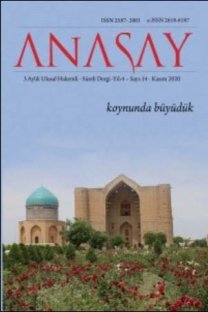TÜRKİYE’DE EĞİTİM HARCAMALARI ve EKONOMİK BÜYÜME İLİŞKİSİ ÜZERİNE AMPİRİK BİR ANALİZ
Eğitim Harcamaları, Ekonomik Büyüme, Türkiye
AN EMPIRICAL ANALYSIS ON THE RELATION BETWEEN EDUCATION EXPENDITURES and ECONOMIC GROWTH IN TURKEY
Education Expenditures, Economic Growth, Turkey..,
___
- Agamben, G. (1999). Means Without Ends: Notes on Politics. (G. Albert, Çev.) Stanford, CA: Stanford University Press.
- Agamben, G. (2001a). Kutsal İnsan: Egemen İktidar ve Çıplak Hayat. (İ. Türkmen, Çev.) İstanbul: Ayrıntı Yayınevi.
- Agamben, G. (2001b). The Coming Community. (M. Hardt, Çev.) Minneapolis: University of Minnesota.
- Agamben, G. (2005). Yaşam biçimi. (S. Özer ve S. Göbelez, Çev.) İtalya’da Radikal Düşünce ve Kurucu Politika içinde İstanbul: Otonom Yayıncılık.
- Agamben, G. (2006). Language and Death: The Place of Negativity, (K. E. Pinkus ve M. Hardt, Çev.) Minneapolis, Oxford: University of Minnesota Press.
- Agamben, G. (2007). The Work of man. (M. Calarco ve S. DeCaroli, Der.) Sovereignity and Life içinde. California, Stanford: Stanford University Press. California, Stanford: Stanford University Press.
- Agamben, G. (2009). Açıklık: İnsan ve Hayvan, (M. Çilingiroğlu, Çev.) İstanbul: Yapı Kredi Yayınları.
- Agamben, G. (2010). Olağanüstü hal. A. Çelebi (Der.) (F. B. Aydar, Çev.) Şiddetin Eleştirisi içinde. İstanbul: Metis Yayınları.
- Aristoteles. (2009). Nikomakhos'a Etik. (S. Babür, Çev.) Ankara: Bilgesu Yayınevi.
- Balibar, E. (2008). Egemenliğe önsöz. Biz, Avrupa Halkı: Ulus-aşırı Yurttaşlık Üzerine Düşünceler içinde (K. Tunca, Çev.) İzmir: Aralık Yayınları.
- Button, P. (2007). Agamben and Foucault on Biopower and Biopolitics. (M. Calarco ve S. DeCaroli, Der.) Sovereignity and Life içinde. California, Stanford: Stanford University Press.
- Borislavov, R. Agamben, ontology and constituent power”. Debatte, v. 13, n. 2, August 2005.
- Calarco, M. (2007). Jamming the Antropological Machine. (M. Calarco ve S. DeCaroli, Der.) Sovereignity and Life içinde. California, Stanford: Stanford University Press.
- Clemens, J. Heron, N. ve Murray, A. (2008). The Work of Giorgio Agamben: Law, Literature, Life. Edinburg: Edinburg University Press.
- Dubreuil, L. (2006). Leaving politics: Bios, Zoē, life, Diacritics. 36-2, Summer, 2006.
- Durantaye, L. (2009). Giorgio Agamben: A Critical Introduction. Stanford, California: Stanford University Press.
- Edkins, J. (2007). Whatever politics. Sovereignity and Life içinde (M. Calarco ve S. DeCaroli, Der.) (K. Attel, Çev.) California, Stanford: Stanford University Press.
- Magnuson, R.(2008). Just Barely: Agamben’s reading of bare life from Benjamin’s Critique of Violence. Strategies of Critique. v. 1, n. 1, Spring.
- McLoughlin, D. P. (2009).The politics of caesura: Giorgio Agamben on language and the law”, Law and Critique, v. 20, n. 2.
- Mesnard, P. (2004). The Political Philosophy of Giorgio Agamben: A critical evaluation, Totalitarian Movements and Political Religions. v. 5, n. 1, Summer, ss. 139-157.
- Mills, C. (2008a). The Philosophy of Agamben. Montreal & Kingston: McGill-Queen's University Press.
- Mills, C. (2008b). Playing with law: Agamben and Derrida on Postjuridical justice, South Atlantic Quarterly, v. 107, n. 1, Winter, ss. 15-36.
- Nancy, J. L. İle-Olmak ve demokrasi, (A. Karakış, Çev.) Demokrasinin Doğruluğu içinde, İstanbul: Monokl, 2010, ss. 73-96.
- Norris, A. (2005). Politics, Metaphysics and Death: Essays on Giorgio Agamben’s Homo Sacer. Durham: Duke University Press.
- Pan, D. (2009). Against biopolitics: Walter Benjamin, Carl Schmitt and Giorgio Agamben on political sovereignty and symbolic order. The German Quarterly, v. 82, n. 1, Winter, ss. 42-62.
- Passavant, P. A. (2007).The contradictory state of Giorgio Agamben. Political Theory, v. 15, n. 2, April, ss. 147-174.
- Schmitt, C. (2002). Siyasal İlahiyat. (E. Zeybekoğlu, Çev.) Ankara: Dost Yayınları.
- ISSN: 2587-2001
- Yayın Aralığı: Yılda 4 Sayı
- Başlangıç: 2017
- Yayıncı: İshak KÜÇÜKYILDIZ
TÜRKİYE’DE EĞİTİM HARCAMALARI ve EKONOMİK BÜYÜME İLİŞKİSİ ÜZERİNE AMPİRİK BİR ANALİZ
ANTİK YUNAN’DAN YAŞAYAN SÖZLER’DE KADIN
GİYİM MAĞAZASI REKLAMLARININ KÜYEREL DOKUNUŞU: GÖSTERGEBİLİMSEL BİR ANALİZ
Tuğba HARBUTOĞLU, Şule Yüksel ÖZMEN
İBN REŞÎK EL-KAYRAVÂNÎ’NİN TASVİRCİLİĞİ: ŞİİRLERİNDE MEYVE MOTİFİ
YENİÇAĞDA OSMANLI PİYADELERİNİN ASKERİ POTANSİYELİ
MÜLKİYELİLERİN “BABA”SI: AYNÎZÂDE HASAN TAHSİN (1876-1962)
HAYATIN HAKKINI GÖZETMEK: GİORGİO AGAMBEN’İN SİYASET FELSEFESİ
KÜRESELLEŞEN DÜNYA’DA DAĞ VE İNSAN ETKİLEŞİMİ: RİZE DAĞLARI ÖRNEĞİ
AN IRONIC INTERSECTION OF REALITY AND FICTIONALITY: TLÖN, UQBAR, ORBIS TERTIUS
